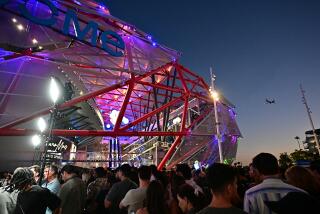Should Georgia blue law be forgot?
- Share via
ATLANTA — The Halo lounge is a vision of Space Age chic, with midcentury-modern lounge chairs, a 40-foot bar made of white onyx, and a custom sound system thumping sinuous dance music.
It’s the kind of “stimulating” nightspot city officials describe in Atlanta’s latest marketing campaign, the one with the slogan “Every day is an opening day.”
But this New Year’s Eve, the Halo will be closed for business -- because New Year’s Eve falls on a Sunday, and Georgia law dictates that bars cannot serve alcohol on Sundays.
Space Age, meet Bible Belt.
“This is tough,” said Halo co-owner Jim Sullivan. “New Year’s Eve is traditionally a big money night for us.”
The “blue law” is one of many around the nation limiting alcohol sales on Sundays. And this year, they are causing headaches for store owners, innkeepers and would-be revelers around the nation.
Some local governments outside Georgia have been scrambling to create special exemptions that would allow the party to go on unabated. In Lexington, Ky., bars may not serve alcohol on Sundays, and restaurants may only do so until 11 p.m.; but this month, lawmakers there made an exception allowing establishments to stay open until 2 a.m. when New Year’s Eve falls on a Sunday.
Vince Carlucci, owner of the strip club Solid Platinum, was relieved. “It means that on a night where we normally can’t be open at all, we basically get to be open on the biggest party night of the year,” he said.
In Georgia, the bar owners’ dark night is looming as the state prepares to reexamine its ban on Sunday alcohol sales in retail stores. Georgia is one of 15 states with such a law.
The grocery and convenience store lobbies expect next year’s Legislature to consider a bill to let local voters decide whether they want Sunday sales of beer and wine in their communities.
It is likely to be a tough sell, especially for rural lawmakers. But a poll released this month by Atlanta-based InsiderAdvantage showed that 58% of Georgians supported the idea.
“I think a lot of people have begun to question why these restrictions should continue to exist,” said Jim Tudor, president of the Georgia Assn. of Convenience Stores.
Alabama and Illinois are among states that allow local governments to set guidelines for Sunday retail sales. In Minnesota and other states, wine coolers and beer with low alcohol content can be purchased in gas stations and grocery stores, but the stronger stuff is off-limits.
Jim Surdyk, owner of Surdyk’s Liquor & Cheese Shop in Minneapolis, said all he could do was run advertisements reminding customers to stock up early. But inevitably, some will forget, though in his state, the bars are allowed to pour on Sundays.
“So that’ll be a big day for the bars,” he said.
Sullivan, the co-owner of Halo, moved to Atlanta from Miami in 1994. He said that the last time New Year’s Eve fell on a Sunday, in 2000, Atlanta lawmakers suspended the blue law. But city officials could find no evidence of that, -- though City Councilman H. Lamar Willis said the Legislature had suspended the law for other big Sunday events, including the last Super Bowl that Atlanta hosted, which was in 2000.
Councilwoman Anne Fauver, who has received a number of calls from worried bar owners this year, said she could do little to help.
“That’s a state law,” she said. “And we can’t do anything about state law.”
In Atlanta, there will be no dearth of places to party in public: Restaurants and hotels are allowed to serve alcohol on Sundays, and they will be pouring until 2:30 a.m., as will a few bars with special-event permits.
But Sullivan thinks the city could have done more to solve the problem of bars like his. He noted that Atlanta’s Chamber of Commerce recently made much of the fact that the city’s young-adult population had increased the fastest among the nation’s largest metropolitan areas during the last decade.
“And yet they won’t even let that desirable workforce enjoy themselves,” he said.
Atlanta law does let bars open at 12:01 a.m. Monday, Jan. 1. So this week, Sullivan was trying to decide whether it was worthwhile to open after the ball had dropped and “Auld Lang Syne” had been sung.
More to Read
Sign up for Essential California
The most important California stories and recommendations in your inbox every morning.
You may occasionally receive promotional content from the Los Angeles Times.













